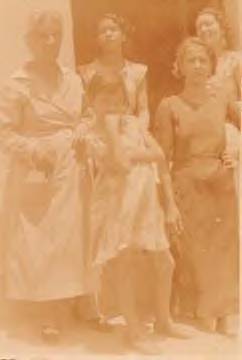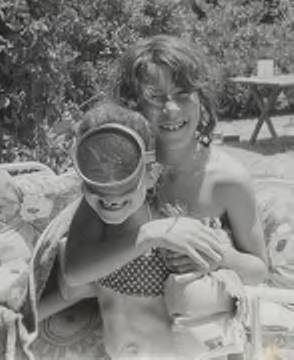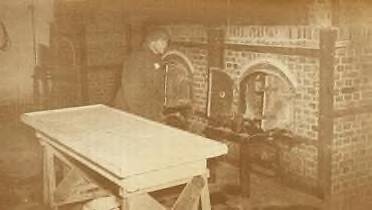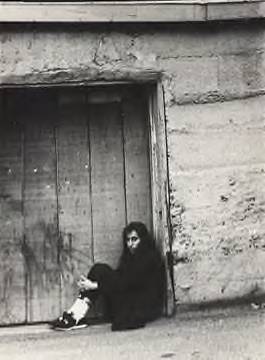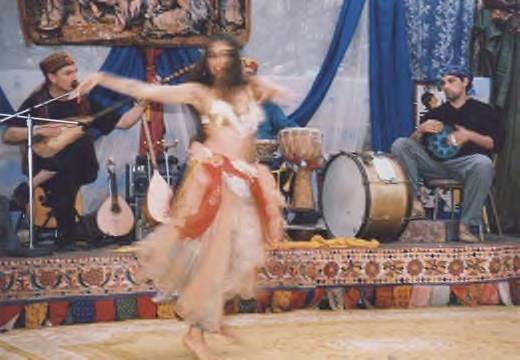|
|
 |
 |
|
The story of Monique Monet begins with the relatively contemporary history of an ancient people: Decades before her birth, her family was
part of an enclave of Middle Eastern Gypsies living on the Syrian/Lebanese border. The Nazi-controlled Vichy government ruled |
|
|
 |
 |
|
the land, and times were tough for the Jews and Gypsies. But life was incredibly worse to the north where the Nazi warlords, in Poland and Hungry, shipped countless innocent
people to cruel and painful deaths in Dachau, Birkenau and other centers of horror. |
 |
 |
|
Monique's grandmother, Rachel, lost several relatives in these camps. And surviving family
members and their friends struggled to escape southward where persecution was |
|
|
 |
 |
|
less deadly. Monique's Syrian-based Gypsy family operated a kind of "underground railway" smuggling Gypsies, Jews, (and whoever else needed to escape the Nazis)
from East Europe, into the relative safety of isolated villages in Syria and Lebanon. |
 |
 |
|
After many months, and after having saved countless lives, the Gypsy family was arrested for crimes against Hitler's Reich. They were initially
sentenced to death by firing squad; but influential friends caused their sentence to be commuted to banishment under penalty of death; banishment for the accused and their posterity for all time. |
|
|
 |
 |
|
The Gypsy clan, about 20 strong, relocated to Venezuela. When the war ended, they moved
again, this time to the promised land -- the United States of America.. |
|
 |
 |
|
They lived in New York for several years, then in the 50's, the family moved west to California. It was
in socially progressive Southern California that Monique's grandmother saw the "writing on the wall" and realized that the ancient Domi (her term for Romani or Gypsy) way of life was moving toward it's
inescapable conclusion. |
 |
 |
|
One of the primary trademarks of the Gypsy people is their adaptability. Grandmother Rachel counseled as
many of the clan as would listen to give up the Gypsy ways and adopt completely the California lifestyle. Her immediate family followed her advice. So, during the 1970's and 80's Monique grew up in a household striving
and succeeding to be modern Americans in every way. |
 |
 |
|
It was not unusual for Monique to spend one Saturday watching morning cartoons with slumber party
elementary school girlfriends; and then spend the next weekend with her aunt, (a Redondo Beach Gypsy fortune teller) playing with her cousins as they practiced, palm reading, tarot cards, and phrenology.
. |
 |
 |
|
The Gypsies' charms and fortune telling were, for the most part, money-making enterprises directed toward
the Gadjo (non-Gypsy population). But these rather cynical expressions of superficial metaphysics were only the surface of true Gypsy occult power. |
|
|
 |
 |
|
In her early adolescence, Monique's natural abilities were recognized by the Old Ones. For a period of two years, it was supposed that
she would become the torch-bearer for the deepest and darkest of Gypsy magic. Against her Grandmother's objection, Monique was trained, guided, and charmed into the realm of the most ancient and powerful
Romani magic and sorcery. To this day, with great regret, she recalls her part in inescapably effective rituals, spells, and |
|
 |
 |
|
projections, and their unquestionable influence on life and death in the everyday material world. |
 |
 |
|
But while still in her teens, she recognized clearly that Grandma Rachel was right, this was not the path for her; and she closed herself off
completely to every aspects and influence of the dark forms of the occult. Today, although she maintains a deep respect for traditional Romani ways; she emphatically rejects all supernatural
expressions of the culture. At the demand of the Old Ones, and with Monique's eager consent, those two years of teenage apprenticeship became little more than a vague space in her memory.
During the years approaching and beginning the new millennium, Monique came to recognize that Grandmother Rachel was also right about something else: The old ways were in deep and irretrievable decline. Just as Rachel
had predicted, a noble culture, predating history itself, was drawing to a close. The Gypsies had always been the wanders, the strangers.
But today, when the vastness of the Earth has been shrunken to the Global Village, and mass media and the Internet have made all people neighbors, the Romani find it increasingly difficult and increasingly purposeless to maintain their mysterious autonomy. The new generation of Gypsies can earn better money and enjoy easier living by cooperating with mainstream society rather than struggling against it. And their children are more than happy to drop anything
foreign and strange in exchange for contemporary role models drawn from movies, sports, and MTV. |
 |
 |
|
These days, Monique is constantly reminded that the ancient ways are nearly gone. The Old World generation has quietly faded away leaving only the
faint legacy of a culture vanishing. |
 |
 |
|
Ironically, today Monique finds herself learning of her people and their culture more often through the crisp pages of a book rather than
from late-night words spoken softly from lined faces. One of her few remaining contacts with the Gypsy life is dance. |
|
|
 |
 |
|
She remembers dance, throughout her growing up years, as the single continuing unifying factor among all
her family members, traditionalists and progressives alike. |
 |
 |
|
Dance was a kind of personal art form. Freedom and self expression were the trademarks of genuine
"Gypsy Dance". The mood was always one of celebration. Creative new movements were as much apart of their dance as the traditional steps. Although she recalls more than a few truly outstanding dancers among
the group, the idea of competition was unknown. There were no "winners" and no "losers". Dance created unity. And while it was always fun and freeing, it was also spiritual. |
 |
 |
|
For many reasons, the big family dance parties have faded into the past. While her current cabaret performances and dance shows are
usually a lot of fun, Monique acknowledges that they can never replace |
|
|
 |
 |
|
the nurturing, relaxed and at the same time exciting, atmosphere generated by the family dance parties of her childhood. |
 |
 |
|
She recently wrote, "Sometimes when I am dancing alone in my studio, I will come to a piece of music that is strongly reminiscent of the old
Domi sound. And as I dance, if the song lasts long enough, I am able to magically escape from my solitary moment. I feel the presence of others -- the rose-scented breeze from their swirling silk, their electric energy,
twirling, shimmying, shimmering. I'm among the Gypsy women of yesterday, and of centuries past, celebrating life through the timeless mystical dance of the Romani." All rights reserved |
|

